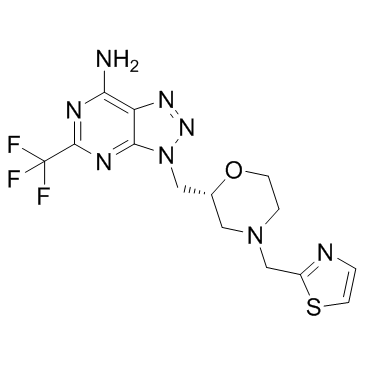| Description |
PF-04957325 is a highly potent and selective PDE8 inhibitor, with IC50s of 0.7 nM and 0.3 nM for PDE8A and PDE8B, respectively.
|
| Related Catalog |
|
| Target |
IC50: 0.7 nM (PDE8A), less than 0.3 nM (PDE8B)[1]
|
| In Vitro |
PF-04957325 is over two orders of magnitude less efficient than PICL in suppressing polyclonal Teff cell proliferation, and shows no effect on cytokine gene expression in these cells, despite its robust effect on T cell adhesion[1]. PF-04957325 is a selective PDE8 inhibitor and inhibits breast cancer cell migration[2]. PF-04957325 greatly potentiates steroidogenesis in WT adrenal cells. PF-04957325 shows a reported IC50 of 0.7 nM against PDE8A, 0.2 nM against PDE8B, and > 1.5 μM against all other PDE isoforms[3]. PF-04957325 treatment of WT Leydig cells or MA10 cells increases steroid production but has no effect in PDE8A (-/-)/B(-/-) double-knockout cells, confirming the selectivity of the drug. Moreover, under basal conditions, cotreatment with PF-04957325 plus rolipram, a PDE4-selective inhibitor, synergistically potentiates steroid production[4].
|
| Cell Assay |
Breast cancer cells are in a total volume of 0.1 mL of fresh medium containing the test reagents or vehicle (PF-04957325). Following incubation at 37°C for 72 h, 20 μL of a combined solution of MTS (2 mg/mL)/PMS (0.92 mg/mL) (20:1, mixed immediately before use) is added to each well, and the plates incubated for an additional 2 h at 37°C, protected from light, following which the absorbency of the formazan product formed is determined at 492 nm using a microtiter plate reader. All reagents tested are dissolved in DMSO and diluted into the cell culture medium[2].
|
| References |
[1]. Vang AG, et al. Differential Expression and Function of PDE8 and PDE4 in Effector T cells: Implications for PDE8 as a Drug Target in Inflammation. Front Pharmacol. 2016 Aug 23;7:259. [2]. Dong H, et al. Inhibition of breast cancer cell migration by activation of cAMP signaling. Breast Cancer Res Treat. 2015 Jul;152(1):17-28. [3]. Tsai LC, et al. Regulation of adrenal steroidogenesis by the high-affinity phosphodiesterase 8 family. Horm Metab Res. 2012 Sep;44(10):790-4. [4]. Shimizu-Albergine M, et al. cAMP-specific phosphodiesterases 8A and 8B, essential regulators of Leydig cell steroidogenesis. Mol Pharmacol. 2012 Apr;81(4):556-66.
|
